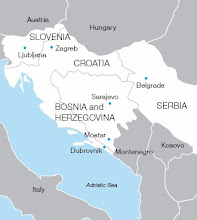Kosovo is the world's newest country. It unilaterally (as in, it didn't cooperate with Serbia) declared independence from Serbia on February 17, 2008. Until then, it was an autonomous province of Serbia. Serbia does not recognized the seccession of Kosovo and still considers it a UN-governed entity of within Serbian sovereign country! To date, these countries have recognized Kosovo.
The history of Kosovo is a long one, going back to at least the 14th century. The Battle of 1389, between the Serbian and Ottoman Empires, was fought on a field near Pristina (the capital). The Battle is an important symbol of Serbian independence to Serb patriots and nationalists. In fact, 1389 is also the name of an underground Serb nationalist group, which protests the seccession of Kosovo. Their grafitti is all over Belgrade, with things like "Kosovo is Serbia" and "Kosovo is the Heart of Serbia." Kosovo is also considered the Holy Land of the Serbian Orthodox Church and the territory is full of natural resources.
During the Kosovo War (1998-1999), Serb nationalists and Kosovar Albanian paramilitaries fought over the territory. That ended when NATO excuted its bombing campaign, making the point that everyone should cut it out. It was pretty awful, a lot of refugees and IDPs - Google it for yourself, I'm too tired to write about death, destruction and disruption now.
There are about 2 million people living in Kosovo and there is about a 90% ethnic Albanian majority, 10% Serb minority. Not sure how much I believe these figures, seeing as that there are over 100,000 Roma who live there, not to mention other national minorities - I don't know how much of the Albanian's majority was manipulated. It is so important to look at things objectively and critically in this entire region. Official languages are Albanian and Serbian. Albanian looks pretty crazy- I was trying to pick up the basics earlier. They have umlauts over their E's and what looks like 10 syllables in every word. Also, Kosovo is "Kosova" in Albanian. So, in Serbia, if you are really pro-independent Kosovo, you can say "Kosova" and people will know your position on the issue. If you say "Kosovo i Metohija," then you are probably a Serb nationalist.
I'm hoping to learn more about the different stances on Kosovo's independence. As an American, it's so easy to get caught up in my country's foreign policy & perspective and support Kosovar independence wholeheartedly. Living in Belgrade for a while has made me think, "No - Kosovo is Serbia!" I'm curious to see what it will be like there - will I be welcomed as an American? Or will they tell, "We're fine thanks, we don't need you or the UN anymore - let us run our own country now."? Not sure how much of that I can gauge in a day and half, but maybe the people on the bus will speak English and I can discuss it with them.
Thursday, April 30, 2009
Subscribe to:
Post Comments (Atom)

2 comments:
You give a 'potted' and simplistic history of this region of the Balkans (Kosova)beginning with the battle fought between armies of the invading Ottoman Empire and those of Serbia.
What you do not mention is that long before the Serbs migrated to this region (soverign state of Kosova)It formed, along with Albania part of ancient Illyria.
Regarding the conflict at the close of the 20th century, we in the UK watched news coverage in horror from the safety of our sitting rooms,of the atrocities of 'ethnic cleansing' comitted against the majority Albanian population of Kosova.
However,prior to this the Serbian authorities had systematically closed Albanian schools and universities, forcing children and students to abandon their language and education.Former academics had no choice but to work as labourers in order to support their families.
Additionally, ethnic Albanians had previously been looked upon as 'third rate' citizens.
It was to redress the balance once and for all that the KLA was masterminded and began opperations.
Believe me, I have worked therapeutically with Kosovan asylum seeking survivors of rape and torture, and have seen at first hand the residue of these atrocities.
'Oleander' (refugee specialist and psychotherapist)
Thanks for your comment, Oleander. I'm sorry that the post was so "simplistic" - I do understand, to a greater extent, what has gone on in the region, but was thinking of my audience (friends & family in the US) as I was writing it. I encourage any reader to research the history at their leisure and make their own conclusions.
I have spend the past few months studying in the ex-Yugo, including 6 weeks in Serbia. I have a good understanding of the acts committed in the conflicts of the late 90s - abuses & atrocities committed by both sides.
Post a Comment